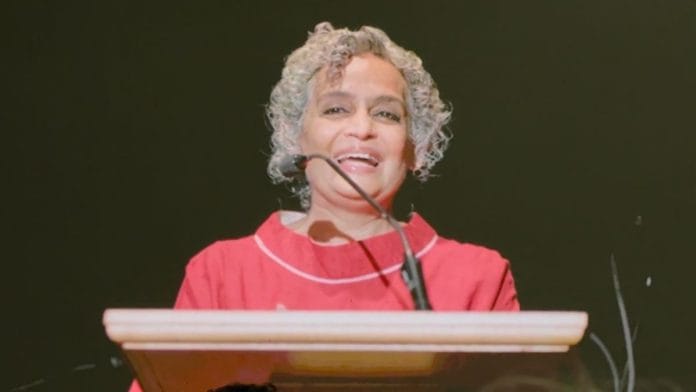Kochi: After Arundhati Roy won the Booker Prize, a fruit seller asked Mary Roy if she was the author’s mother. “She called me up and told me she felt like she had been slapped,” Roy said, laughing at the memory.
Of course, her mother was proud, the author clarified at the official launch of her memoir, Mother Mary Comes to Me, in Kochi. “A student from her school had won.”
For half of Mrs Roy’s lifetime, Arundhati was known as her daughter. Somewhere down the line, the educator became known as Arundhati Roy’s mother.
“She resented it. She built her space in that small town, and she didn’t want to be undermined by a daughter-type person,” said Arundhati, chuckling.
On Tuesday, over a thousand people gathered at two packed halls at St Teresa’s College, braving the humid weather and arriving from across the globe to meet their favourite author. The evening carried everything one expects in Arundhati Roy’s presence: emotion, wit, and politics. And at the centre of it all, the unravelling of a complicated relationship between feminist mother and feminist daughter.
“Almost everyone that I love is gathered in this room. That’s a pretty dangerous thing, given our government,” laughed Roy. “For a normal person, this would be her wedding or funeral, but thank god I’m not normal.”
And the audience—young, old, middle-aged, with children in tow, movie stars, students, family, friends, publishers and more—laughed with her.
Roy was quick to turn her attention to tragedies across the world and at home.
“As I prepared to come on stage, the High Court once again denied bail to Umar Khalid and to many of my friends who have been in prison for five years,” said the author.
Also read: Mary Roy was more than a teacher to her students. She was a dreamer, warrior
The smell of men
When introducing Arundhati Roy, acclaimed Malayalam author KR Meera rattled out a list of her roles—architect, actor, screenwriter, author, essayist, activist. But what got one of the biggest applauses of the night was Meera’s description of Roy as “an official urban naxal and a professional sedition inspirer”.
“She is the only writer in India that all the fascist governments in the world are listening to. She is the true Indian international writer,” Meera said.
But this book is the “political history of Arundhati”. It centres her mother, Mary Roy.
An educator and women’s rights activist, Mrs Roy is best known for her landmark 1986 Supreme Court victory, securing equal inheritance rights for Syrian Christian women in Kerala. She founded Pallikoodam, a residential school in Kottayam, famed for its hands-on education model.
“Mary Roy is unmissable on every page—teacher, litigant, matriarch, school principal, and force of nature,” said Manasi Subramaniam, Editor-in-Chief and Vice-President at Penguin Random House.
Mrs Roy packed herself and her kids away from their father, Micky Roy, when Arundhati was around three. Roy recalled how, when she met her father for the first time after that, he asked her two things: Do you still use bad language? And do you remember how your mother thrashed you for saying, at three years old, ‘You know Mamma, I love the smell of men.’
There is a marked difference in the way the two women see men. Mary Roy was bitter. “She had a very bitter experience with men. Her father was extremely cruel, her husband was irresponsible, and her brother was a bully,” said Arundhati.
She writes that her wrath extended even to her son, Lalit Roy.
But the author was quick to exclaim, “I love men”, with an impish smile, when Subramaniam asked her if she viewed them the same way as her mother.
“I’m not bitter [like my mother] because,” she paused for a second, cracked a smile, and said, “I know how to handle them.”
A response
Mary Roy died on 1 September 2022; that’s when Arundhati started toying with the idea of writing about her.
“I was walking in London one day with my agent, and I said to him that my mother was my shelter and my storm. He turned around and said ‘So when are you writing this book’,” recalled Arundhati.
The author recalled how she and her brother, who was in the audience, dreaded the day when the school report cards would come because of the violence that ensued. But there was no way to respond to her, Arundhati said. Her mother’s recurring asthma was a mode of control; any conflict could trigger an attack. So Arundhati, who describes herself as her mother’s “valiant organ child”, chose to keep quiet and be her mother’s lungs.
But now she can breathe easy. “To me, this [the memoir] is my response to my many years of not responding. It’s high time I was able to respond to her after a life of keeping quiet.”







Umar Khalid and his accomplices responsible for conspiring and carrying out the Delhi riots and killings should rot in jail. If they are Arundhati Roy’s friends, maybe she should ask her other friends in the CIA and American deep state who helps her get splashed on NyT to help with it. I cannot think of a bigger Hindu hater than Roy. And currently Americans are nourishing Hindu hatred and championing Christian supremacy. Roy has been doing the rounds of heavily evangelical funded colleges in the US for her moment in the NYt. She got it. So maybe she can use her skills to help her riotous killer friends like Umar.